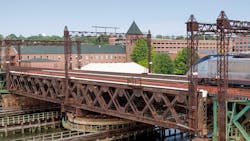What projects could see FY22 funding through 'congressionally directed spending'?
The Fiscal Year 2022 appropriations process made room for specific projects to receive funding under the designation of “community project funding/congressionally directed spending,” or as it is informally known, earmarks.
Earmarks have returned to the appropriations process following implementation of a series of reforms designed to add transparency to the process and prevent potential abuse. For example, each elected official who submitted projects for consideration had to post those projects on their website and submit a certification that neither they nor their immediate families had any financial interest in the requested projects.
The overall principal of this type of spending is that elected officials know their constituent’s needs and the impact a specific project can have within a community better than anyone outside their community.
Community project funding/congressionally directed spending was capped at one percent of total discretionary spending for FY22. There were three accounts where transit and passenger rail projects could be designated to receive this spending within the U.S. Department of Transportation’s (USDOT) division of the bill. The three accounts – Transportation Planning, Research and Development; Consolidated Rail Infrastructure and Safety Improvements; and Transit Infrastructure Grants – contain a total of $328.7 million for projects marked as community project funding/congressionally directed spending.
What projects were designated for funds
Within the funding provided the Federal Railroad Administration in the proposed FY22 Omnibus Package is $120.9 million for congressionally directed spending and within the Federal Transit Administration funding, the set aside for this spending is $200.8 million.
Additionally, Transportation Planning, Research and Development grants managed by USDOT have more than $7 million for congressionally directed spending. Out of the seven projects approved and included in the FY22 Omnibus Package, six are transit related; they include:
- $2 million to the Southeast Conference for an electric ferry pilot program.
- $1 million to Los Angeles County metropolitan Transportation Authority for the West Santa Ana Branch Transit Corridor.
- $1 million to ITNAmerica to support America’s Volunteer Driver Center.
- $1.3 million to Sayreville Economic and Redevelopment Agency in New Jersey for the Sayreville Waterfront Multimodal Transportation Improvement Project.
- $750,000 to Berks County, Penn., to study reestablishing passenger rail between Reading and Philadelphia.
- $750,000 to the Wisconsin Department of Transportation for its Connected, Automated, Electric Vehicle Demonstration Center.
There were 17 projects designated under the Consolidated Rail Infrastructure and Safety Improvements account and among those, six are related to passenger rail improvements. They include:
- $800,000 to the Vermont Agency of Transportation for the White River Junction Amtrak Station Platform Reconstruction project.
- $3 million to the village of Essex Junction, Vt., for the Essex Junction Multimodal Train and Bus Station Redevelopment project.
- $2.5 million to the Rhode Island Department of Transportation for the Kingston Train Station Intermodal and Parking Expansion project.
- $300,000 to the city of Ypsilanti, Mich., for the Ypsilanti Train Station.
- $5 million to the Maryland Transit Administration for Baltimore Penn Station Facility Improvements.
- $8 million to the Georgia Department of Transportation to produce the Environmental Impact Statement for the Atlanta to Savannah Passenger Rail project.
Within the Transit Infrastructure Grants account, there were 80 projects approved for funding in 27 states. The projects include 16 facility focused projects, two shelter or stop projects, 20 electric bus projects, two ferry projects, four bus rapid transit projects, six projects to enhance services, 18 rail projects, six bus replacement projects and six technology focused projects.
Projects with the highest awarded funds include:
- $10 million to the San Diego Association of Governments for the COASTER Commuter Rail Corridor Stabilization project.
- $15 million to the Connecticut Department of Transportation for the Walk Bridge – Undergrade Bridges Demolition and Replacement project in Norwalk.
- $10 million to the city and county of Honolulu for the electrification of the Route 40 bus.
- $8.25 million to the Illinois Department of Transportation for the Illinois Electric Bus and Charging Infrastructure Program.
The House voted to pass the FY22 Omnibus Package late Wednesday night and it now heads to the Senate.
More on the FY22 Omnibus Package can be found in this companion article. A full list of approved community project funding/congressionally directed spending projects is linked here.
About the Author

Mischa Wanek-Libman
Group Editorial Director
Mischa Wanek-Libman is director of communications with Transdev North America. She has more than 20 years of experience working in the transportation industry covering construction projects, engineering challenges, transit and rail operations and best practices.
Wanek-Libman has held top editorial positions at freight rail and public transportation business-to-business publications including as editor-in-chief and editorial director of Mass Transit from 2018-2024. She has been recognized for editorial excellence through her individual work, as well as for collaborative content.
She is an active member of the American Public Transportation Association's Marketing and Communications Committee and served 14 years as a Board Observer on the National Railroad Construction and Maintenance Association (NRC) Board of Directors.
She is a graduate of Drake University in Des Moines, Iowa, where she earned a Bachelor of Arts degree in Journalism and Mass Communication.
